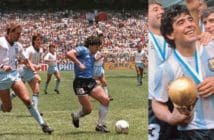
Bobby McMahon:
In this piece, he looks forward and back at the factors that will influence the big decisions in Zurich tomorrow.
You can read his view on a daily basis on Bobby McMahon’s Blog . The article is in three parts.
Part One – Corruption and when FIFA once awarded a bid 16 years ahead
Part Two – Don’t trust what you read
Part Three – The strategy of securing votes and where it can go wrong
Part One – A Brief History of Corruption
Within a matter of hours we will know which countries have secured the rights to host the 2018 World Cup Finals and the 2022 World Cup Finals. The winners will delude themselves that their awards were simply based on being the best and losers will in public be magnanimous, but in private be crest-fallen and dismissive of the process and the men who rejected their Bids.
This particular round of World Cup bidding as been particularly vile given the allegations – some considered proven – of corruption both new and old. Add to this the dynamic of collusion and vote trading and it all adds up to a thoroughly repugnant process.
The responsibility for corruption and collusion sits firmly at the door of FIFA. One only needs to contrast how quickly the IOC has moved to investigate the allegations made against FIFA Vice President and IOC member Issa Hayatou while Sepp Blatter’s FIFA sits back and dismisses the assertions with a “let them eat cake†attitude.
The Olympic movement has already gone through their Waterloo and are at pains to ensure that it doesn’t happen again. When the successful Salt Lake bid for the 2012 Winter Olympics was shown to have been dirty the IOC was forced to move to try and root out the corruption and bribery that threatened to overwhelm the organization.
However, the IOC’s hand was not forced by public opinion directly but by the sponsors who regularly anti-up hundreds of millions of dollars to attach their companies to the “ideals†of the Olympic rings.
It was under the threat of losing multi-millions that the IOC finally acted and set in motion a system and structure that more rigorously controls the bidding process. Until sponsors make the same demands on FIFA to clean up their internal organization nothing will change.
Of course it is paradoxical that one of reasons put forward for jointly awarding 18 and 22 was in fact leveraging sponsors. It may in fact work (leveraging sponsors that is) but the decision has only made a murky pool even darker with allegations of vote swapping and collusion.
This issue provides a perfect illustration of how much the world of sports has changed over the last half century. Politics have always been a factor in such decisions but over the years such considerations have become entwined with the increasing commercial opportunities through the media and television attention that has grown exponentially.
The combination has made for a potent cocktail and money and resulting power has undoubtedly become a sporting and business aphrodisiac.But what if you take the 2010 reality and subtract media, TV, and money – what do you get? You probably get something like the meeting held in London in 1966.
In 1964 Mexico had been awarded the right to host the 1970 World Cup Finals. But rather than selecting a host for the 1974 Finals, FIFA actually named the hosts right through to 1982 – that was 16 years in advance.
Both West Germany and Spain submitted bids for 74 and 82 (these were the days when the award rotated between the Americas and Europe) so Spain stood aside and allowed West Germany the rights to 1974 and vice versa for 1982.
Bizarrely Mexico still had a bid on the table for the 1978 Finals even though they were to be the 1970 hosts. Argentina had lost the 1970 race (and later also failed to qualify) but were acclaimed the 78 hosts when Mexico stepped aside.
The whole process was marked by a much more civil attitude to the problem but such an approach will never return.
Part Two – Beware of Journalists
Journos, commentators and bloggers are very much into the prognostications and predictions mode as we edge closer to decision day 2018 and 2022.
The basic problem with most of these pieces is that what you are getting is an opinion filtered through the writer or commentators lens – you are getting an opinion based on what they think is important.
What’s more what they think is important almost always mimics the strength of the Bid from the country they are most closely associated with.
Even worse you may be receiving unfiltered echo journalism –a rehash of what others have said is important so it become even more important because “everyone†is saying it.
Analysis that gives thumbs up (or down) to hotels and transportation systems give the illusion of a comprehensive process but the process is anything but. As I pointed out in an article in October it is all smoke and mirrors.
On the most fundamental level it is impossible to assess a bid that exists only in concept especially when others are in various stages or readiness.
The fact that FIFA are awarding one bid 12 years in advance is another interesting and comparison-distorting wrinkle. In my other work life I have just undertaken a stadia analysis for a client and it shows clearly that the economic life-span of a North American stadium has fallen dramatically in the last two decades.
Where a 50-year amortization might have been normal years ago that period is now no more than 25 years.
So to echo a point that Derek Taylor has made to me and others this should surely be detrimental to any Bid that purports to see an existing state of readiness as a core strength of their proposal.
When you get right down it, my opinion, your opinion and all other opinions don’t matter. The only opinions that matter are those of the 22 (or 23 or 24) members who will cast votes to decide the hosts for 2018 and 2022.
Each member will make his decisions based on a myriad of complex factors almost exclusively relating to emotions and relationships.
These emotions and relationships will unique to each voter and any post-Award analysis that claims that one or two factors swung the day should be treated with the upmost scepticism.
The emotional stress should not be underestimated either. A look back at the 2006 vote stands as testament to how impossible it is to predict the outcomes on Thursday.
Many would not have been surprised at Morocco being eliminated after the first round of balloting.
But England out in round two with fewer votes than they achieved in round one? Who anticipated England going out in what might have been the equivalent of the quarter-finals? (Ooh yeah)
And after that came the equivalent of a nuclear detonation with Charles Dempsey enshrining his name in soccer history by doing nothing. His abstention proved to be the same as vote for Germany and South Africa lost.
Did anyone see the 2006 vote unfold like that? Don’t think so.
Part Three- What Decides the Winner
Here is a look at some of the dynamics around Bidding for major events and what goes in to securing votes…and how it may also go wrong.
Journalists become Bid supporters
Journalists gulp down the cool-aid and are too quick to dismiss other Bids. They forget that the good feelings emanating from “their†Bid are often created by the Bid Committee telling each other how brilliant their Bid is rather than looking to more unbiased opinions. Toronto’s multiple Olympic bids, England’s World Cup for 2006 and Chicago 2016 first round exit are striking examples.
Front runner curse
No one wants to be second but history tells us that the favourite often flubs their lines. Examples in recent years would be Paris losing to London in the bid to host the 2012 Olympics, and Athens losing the 1996 Olympics to Atlanta. Being a front-runner comes with a special emblazoned target for others to aim at.
Making it to the second round
There are examples of awards being decided on a first ballot with one Bidder achieving the 50% + 1 vote threshold. However, this tends to be more prevalent with only two or three bidders. When four or more are involved job one for a Bid Committee becomes “make it to round two.†As will be explained in more detail below dynamics can shift quickly and unpredictably – but if you get booted in round one you can only watch and think – “what ifâ€.
Reading to much into very little
As voting day draws closer Bid Committees and journalists are constantly looking for hints and signs of voting intentions. Often good manners or civility are mistaken for support. There is often a misunderstanding of cultural differences – in some cultures it is considered rude to say no and so often a voter is regarded as “undecided†when in fact they know who they are going to vote for.
Committed votes
Much has been made of the eight secure votes supposedly committed to Spain/Portugal’s bid for 2018. Eight should be enough to keep the Iberian bid in the mix until the final round of balloting if that number holds.
But beware of “contrapreneurs.â€Â A politician once used this word to me when describing people who fake support for a project but work behind the scenes to undermine it. The only certain vote is the one that has been cast.
You also have to consider that in this situation eight is not enough to win and when making such a public statement about holding that number of votes the Bid Committee also runs the chance of galvanizing support for others – a variation of the Front Runners Curse. That support can then create a dynamic whereby support for other bids evaporates and instead gravitates to the one bid with the best chance of stopping the self-proclaimed favourite.
Being a second choice can be good and even third choice is no always bad
Less work goes into battlefield plans than may go into well-designed voting strategies. In particular the understanding that being a voter’s number one choice is not the be-all of the vote. As long as you can garner enough votes to make it to round two the low Bid in round one gets knocked out and any votes they received are now up for grabs.
A successful rollover of beaten Bids can change the voting dynamic considerably with big moves being made in round two. This is often the case with Olympic bids where well over 100 IOC members are entitled to vote. Nonetheless even with the limited electorate of FIFA securing two or three votes can be vital in surviving to fight another day or putting one candidate over the top.
The same is true of being a third choice and even a fourth in the cases of a field of five. Voter’s who have supported Bids that have been knocked out in earlier voting need to a park a vote someplace. Getting such a promise can make a decisive difference.
The Fog of War
The complexities and variability at play – especially with four or more Bids – can be so overwhelming that it can prove impossible to get a handle on all the possibilities.
Just consider the situation when it may depend on selecting the right messenger rather than the message in order to secure the vote. There is also the issue of language and during final presentations some of the voters may be relying on simultaneous translation in order to get the information.
Hundreds of thousands of hours of prep, millions of dollars and countless kilometres flown and a vote might be swayed by the emphasis or the choice of words made by a translator.
Related Stories:
Celebrities Arrive in Zurich for Decision Day
Boost for USA Bid as Oceania Abandons Plan to Vote
Steven and Harrison Stark on the 2018 Race
Steven and Harrison Stark on the 2022 Race
Olympics to Investigate FIFA Corruption
Donovan Arrives in Zurich for Last Push for USA Bid
BBC Accuse Four More FIFA Officials by Name
FIFA Delegates Found Guilty and Banned from World Cup Voting
![Prost International [PINT]](https://prostinternational.com/wp-content/uploads/2021/08/PINTtFontLogoRoboto1536x78.jpg)



1 Comment
The people of Middle east are crazy about Soccer. I am very happy for Qatar and the rest of the region. We need good news coming from that part of the world. I hope this inspires the youth of indulge in sports rather than violence.
Also very disappointed with some of the comments here. The people living in Qatar may have a different lifestyle than us, but they deserve this as much as any other nation. Also an event like this will help the liberal forces in the middle east and will be a defeat for extremist.